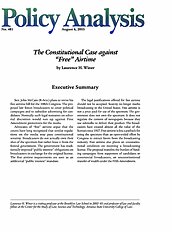Sen. John McCain (R‑Ariz.) plans to revive his free airtime bill for the 108th Congress. The proposed law forces broadcasters to cover political campaigns and to subsidize advertising for candidates. Normally such legal restraints on editorial discretion would run up against First Amendment protections for the media.
Advocates of “free” airtime argue that the courts have long recognized that similar regulations on the media may pass constitutional scrutiny. Broadcasters do not actually own their slice of the spectrum but rather lease it from the federal government. The government has traditionally imposed “public interest” obligations on broadcasters in exchange for the original license. The free airtime requirements are seen as an additional “public interest” mandate.
The legal justifications offered for free airtime should not be accepted. Scarcity no longer marks broadcasting in the United States. Free airtime is not a price paid for use of the spectrum. The government does not own the spectrum. It does not regulate the content of newspapers because they use sidewalks to deliver their product. The broadcasters have created almost all the value of the licenses since 1927. Free airtime is less a payback for using the spectrum than an open-ended effort by Congress to extract favors from the broadcasting industry. Free airtime also places an unconstitutional condition on receiving a broadcasting license. The proposal transfers the burden of funding campaigns from supporters of candidates to commercial broadcasters, an unconstitutional transfer of wealth under the Fifth Amendment.
About the Author

This work is licensed under a Creative Commons Attribution-NonCommercial-ShareAlike 4.0 International License.
